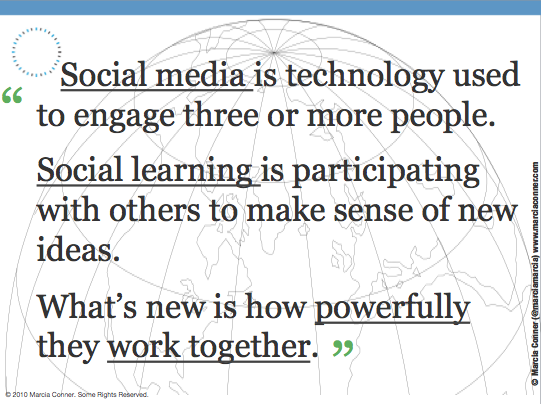e-Learning Ecologies MOOC’s Updates
Social Learning: Cultivating a Culture of Constant Collaboration
The concept I would like to focus on is Social Learning. According to Marcia Conner, author of the book The New Social Learning, the concept is defined as follows:
While I am not one to step on an expert’s toes, I want to counter Ms. Conner’s definition, if ever so slightly. As far as social learning goes, why does the discussion have to surround new ideas? I think that social learning can be tapped to show (through video, images, and other media) how people—whether they be actual students, co-workers, or just people with common interests—do something routine, but perhaps do it differently than others to better outcomes. I focus on this concept in particular as it connects to a recent project I have been working on in my professional role as an educator in the government sector. In this project, I am designing elearning that will go out to probation officers across my state to teach them a new framework for deciding how to incentivize probationers to encourage good behavior and growth. Incentives are nothing new, but the framework provides some guidelines for how to target these incentives for better results. This elearning project is based on an in-person “sage on the stage” type training, but what struck me about this training was when the students/probation officers started giving examples of ways they have provided incentives, there was a lot of interest and discussion in the group that had to be shut down in service of moving on with the rest of the scripted content.
What amazed me about these interactions is that these are not people who are physically far from each other—many of them work in the same building—but the nature of their work is so independent that they often forget that they have excellent support and resources all around them in their peers and coworkers. This showed me how much social learning and shared online spaces can offer so much to this community as well as other groups within my organization. If everyone can share success stories (or even failures) even the most everyday activities could be improved. Social learning can overcome distance and provide answers to those who need it, when they need it. I think there is also some safety in social learning as people tend feel more at ease sharing the problems they have run into, which in turn can ease the anxieties and fears of their peers who can breathe a sigh of relief knowing that they are not alone. Social learning also allows leaders and subject matter experts to emerge—people whose job title may not reflect the knowledge they possess, but who nevertheless provide a contact for others who would like to connect with them and know more. Having a record of these interactions could also contribute to everything from new projects to best practices to better elearning classes to deciding who has the proven knowledge to move up in leadership.
While I am still thinking of ways for these groups to safely share their expertise and experiences with social learning (government work tends to deal a lot with people's private information), I wanted to see how social learning has been implemented in other organizations. The Canadian telecommunications organization, TELUS, has utilized social learning since at least 2011. In the video below, TELUS Director of Learning and Collaboration, Dan Pontefract, speaks about how social learning has allowed everyone in the company, no matter where they are in the world, connect with each other in real time. In this company newsletter, there is a staggering statistic that, between 2009 and 2010, the funds for informal social learning platforms went from 10% of the learning budget to 40% within the company. I hope to dig deeper and find out how it has grown and changed the company since its implementation, as they have now had seven years to grow and hone these platforms.
In episode 29 of The eLearning Coach Podcast, Social Learning Is a Way of Life, Ms. Conner notes "To learn is to optimize the quality of one's network." While social learning can start with a large network, over time, that network can be honed and specialized so that subject matter experts emerge, and people can find and foster communities that would have never existed without a shared social space. These communities can have a huge impact not only on the individuals involved, but on an organization at large. Social platforms provide an easy conduit for information to flow through and can further ingrain the habit of constant learning into an organization's, a school's, or even a company's culture.



